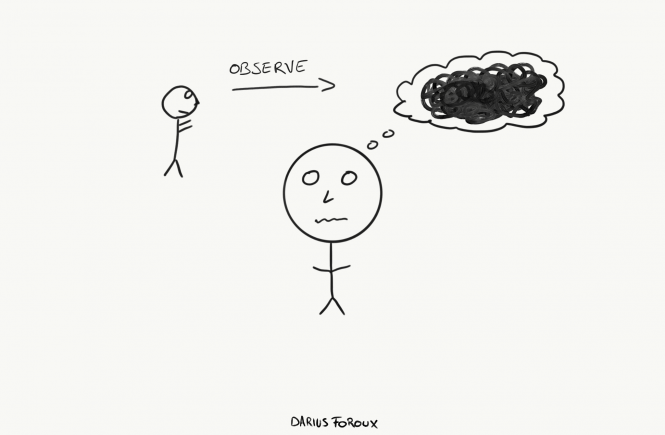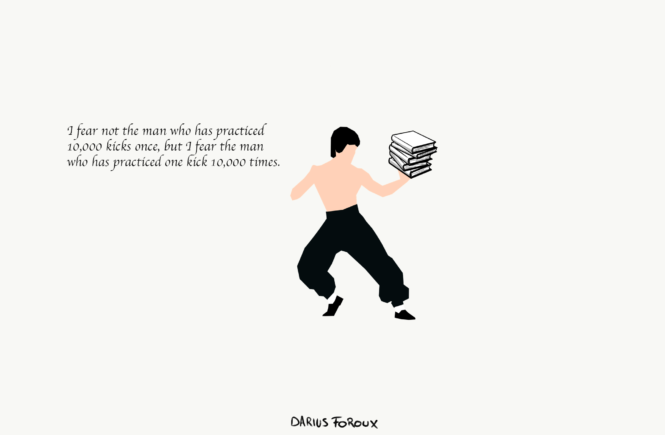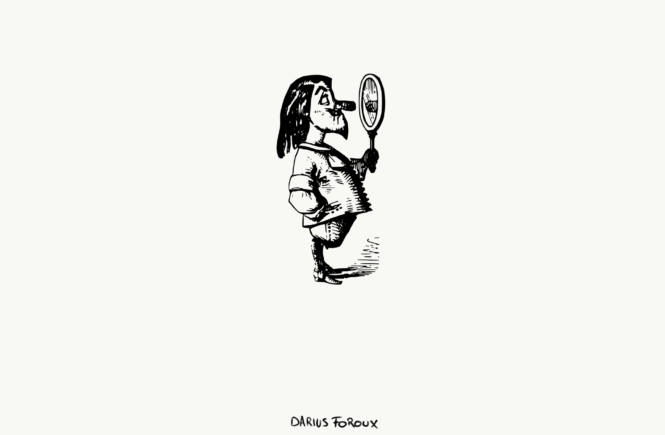Do you regularly feel overwhelmed and restless? Do those feelings arise without a clear reason?
It happens to all of us. During those moments, we feel bad. We make the wrong decisions. And we give in to our desires. All of us experience moments of weakness. Especially when we’re alone, not knowing what to do.
In those moments, we whip out our phones and consume some crap on the news or social media. And that makes things worse.
And all of a sudden, you start to question everything about life. Your mind is out of control. And you can’t think straight anymore. It’s a harmful state of mind.
But we’ve all experienced the opposite as well: Being in the zone—fully focused on a single task.
So why do we still experience those moments of overwhelm? It has something to do with someone who’s living in your head.
The Idiot That Lives Inside Everyone’s Head
We all have an idiot living inside of our heads. It’s the inner voice that says:
- You’re not good enough
- You need to make more money
- You suck!
- Look at how successful others are
Instead of getting consumed by the idiot that lives inside our head, we need to learn how to CONTROL that moron.
Almost all philosophies share the wisdom that we can use to tune out the idiot in our minds. I’ve used Stoicism in the past to improve my mental toughness.
But I have also been interested in the teachings of Buddism. I especially like Mindfulness, which is a pure way of looking at the world that’s obtained by meditation. What I’ve learned is that the world of Mindfulness is very rich, with many different traditions.
One of the lessons is that there is no right or wrong way to meditate. The basis is to experience life in the present moment, without judgment. That’s why Mindfulness promises that you can experience life in the purest form.
Because we often don’t experience life the way it is. We experience a version of life that’s colored by our thoughts.
Mindfulness pioneers in the West are Thích Nhất Hạnh, Jon Kabat-Zinn, Bhante Gunaratana, and many more that believe in the power of this tradition.
The science is also clear about its effects. The practice of Mindfulness has been used to reduce stress, anxiety, and symptoms of depression; it has a positive relationship with mental health.
Meditation Is Not For Everybody
But does that mean Mindfulness is the right thing for you? After studying it for several years, I think everyone can benefit from the ideas. We live in a noisy world. And a little bit of inner calm and focus doesn’t hurt.
But how should you go about Mindfulness? Should you meditate? Should you go on retreats? Visit a temple? Even though everyone can benefit from Mindfulness—how you apply it in your life varies for every person. It also depends on your life situation.
For example, I’ve tried meditation several times. Also for longer periods. It’s just not for me because it made me feel depressed. But I still like the ideas of Mindfulness. So meditation is not always for me (I might try yoga). I think everyone should decide for themselves. Never do something just because other people say you should. Always make up your own mind. And keep learning.
My favorite way to learn in general is by reading books. What you’ll find below are 5 books that I found useful. If you want to learn more about Mindfulness, these books will help you.
1. Wherever You Go, There You Are by Jon Kabat-Zinn
Kabat-Zinn is a professor of medicine who brought science in Mindfulness. He’s widely respected by Mindfulness teachers and his book, Wherever You Go, There You Are, serves as a perfect introduction to the practice. Highly recommended for people who prefer a practical and scientific approach to Mindfulness, which can be very esoteric.
2. The Miracle of Mindfulness by Thích Nhất Hạnh
Thích Nhất Hạnh is one of the most well-known Buddhist monks. And in his book, he shares his practical lessons for living in the present. It’s an excellent introduction to meditation. It’s also a short book that you can read in a day or two.
3. Stillness Speaks by Eckhart Tolle
Technically not Mindfulness because Tolle says he doesn’t follow any tradition. Some people dislike his books because of that. But I found Stillness Speaks great. He does a good job at summarizing Buddhist teachings into short paragraphs. This book is more like a collection of aphorisms. Great to understand the concepts behind living consciously.
4. Waking Up by Sam Harris
Sam Harris is mostly known for his controversial views on religion and politics. I’m not interested in that. I like his view on Mindfulness. He’s inspired by Jon Kabat-Zinn who said that using Mindfulness will wake you up. We’re so lost in thought that we live on auto-pilot. Sam Harris shares Mindfulness practices for people who are not religious or spiritual. Highly recommend if that’s you.
5. Mindfulness In Plain English by Bhante Gunaratana
This was my favorite book on the topic. Bhante Gunaratana does a great job in sharing the Mindfulness practices in a simple way. When you read the book, you can tell he wants the best for the reader. If you only decide to read one book on Mindfulness, make it this one. It shares the ideas behind the practice but also gives practical tips to become better at meditation.
Remember, if you don’t like to read books, you can always listen to them with Audible. And most of these books are also available on Blinkist, where you can read or listen to the summaries.
Don’t Read Too Much
You know, this whole quest for knowledge, enlightenment, and more wisdom is a complex thing.
When you read about the ideas in the above books, you will feel better about life. You will feel more at ease. But there’s a downside.
When you always keep on searching for the next piece of wisdom, you’re doing it all wrong. At some point, you must get on with your life. Don’t make your whole life about this mindfulness and spirituality stuff.
Also, every time I write about this stuff, angry people with meditation businesses attack me. They want to prove how much knowledge they have and how wrong I am. I don’t care about those people and never respond.
I don’t have anything to sell here. I’m sharing my experience. What you do is up to you. At some point, I was studying Mindfulness and not practicing it. But I realized that’s not the purpose.
I want to DO something with my life. And practicing Mindfulness helps with that.
Think about your own goals. And look for things that support your goals. If this stuff helps, use it, if not, don’t. At the end of the day, we all want a good life. With these books, you have enough tools to achieve that.
Just remember to use the ideas and not to get stuck inside them.




